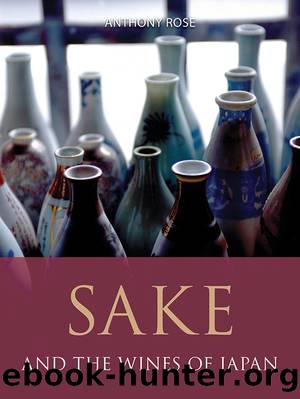Sake and the wines of Japan by Anthony Rose

Author:Anthony Rose
Language: eng
Format: epub
Publisher: Infinite Ideas Ltd
Published: 2018-10-16T16:00:00+00:00
Naoko Tajime, Chikusen, Tajime Partnership, Hyōgo
‘No-one forgets their umbrella in this area,’ says the bubbly Naoko Tajime who, with her husband, Hirotaka, is involved in all aspects of the brewery. The son of the eighteenth generation owner, Sadahiko Tajime, was tragically killed in a car crash in 1996. So, in 1999, after meeting her at the National Sake Research Institute in Saijō, Hiroshima, Hirotaka Tajime joined Sadahiko’s second daughter Naoko in the running of Tajime. Hirotaka, whose family brewery, Kanbai, is in Saitama, where he was born, teamed up with Keiji Takahashi, the tōji at Tajime since 2005, and they began focusing on junmai. By 2012, they had decided to brew only junmai sake, in the firm belief that junmai, with its umami content, is the best marriage with food, not least the local vegetables from the area such as the soft, sweet Iwatsu leeks, and Tajima beef.
The Tajimes are focused on making sake from local rice (98 per cent of the rice they use is local with just 2 per cent from Hyōgo) bought from contract growers. From using only organic Gohyakuman-goku rice konotori hagukumu, they have expanded to organic Yamada-nishiki konotori hagukumu. This is a stork-friendly, pesticide-free rice grown by farms branded Konotori Hagukumu Okome (‘rice to foster storks’) to allow the endangered Oriental White Stork to forage in the natural ecosystem. Konotori hagukumu is the heart and soul of Tajime’s sake and even embodied in the prayers of the local people for a revival of the natural habitat. They also use Omachi, Hyōgo-nishiki, and Dentokoi.
Chikusen Organic Junmai Konotori (15% abv), polished to 40 per cent, is spicy, dry and umami-rich. Chikusen Junkara (jun – rich and flavoursome, kara – dry) Nama Junmai Genshu (18% abv), made from Gohyakuman-goku is a powerful, juicy-textured unpasteurized sake the power of which is offset by its zingy freshness. Chikusen Junmai Daiginjō Konotori Shizuku (the most expensive in the range at ¥21,600, using rice polished down to 40 per cent), is an impressively rich and concentrated sake with real depth and intensity of flavour. The Chikusen Junmai Yamahai Nama, is a super-dry, mellow-textured sake shot through with savoury umami notes. Juicy local plums meanwhile go into their refreshingly sour, home-made-style Umeshu Junmai Yamada-nishiki.
Chikusen is open for visits on weekdays and Saturdays. An appointment is needed and only Japanese is spoken. There is a showcase rather than shop as such, as part of the brewery where visitors can buy bottles of sake. The local area is home to the impressive ruins of medieval Takeda Castle, the Ikuno-Ginzan Silver Mines, Asago Art Village, Asago Geijyutsunomori museum (forest of the arts museum) and the Meiji-era Road of Ores.
Hakutsuru Sake Brewing Co., Ltd
4-5-5 Sumiyoshi Minami-machi, Higashinada-ku, Kobe, Hyōgo, Japan 658–0041
Tel.: + 81 (0)78 822 8921; email: [email protected]; [email protected]
www.hakutsuru.co.jp/english
If Hakutsuru’s cool, young president, Kenji Kano, had wanted to make a point about the growing number of young women drinking sake, he couldn’t have chosen a better place than Kobe’s popular izakaya, Sake Yasiro. Tables of women in
Download
This site does not store any files on its server. We only index and link to content provided by other sites. Please contact the content providers to delete copyright contents if any and email us, we'll remove relevant links or contents immediately.
For the Love of Europe by Rick Steves(3258)
The Sprouting Book by Ann Wigmore(3054)
BraveTart by Stella Parks(2973)
Better Homes and Gardens New Cookbook by Better Homes & Gardens(2956)
The Death of the Heart by Elizabeth Bowen(2906)
Salt, Fat, Acid, Heat: Mastering the Elements of Good Cooking by Nosrat Samin(2659)
Sauces by James Peterson(2592)
Classic by Mary Berry(2504)
Solo Food by Janneke Vreugdenhil(2494)
The Bread Bible by Rose Levy Beranbaum(2475)
Ottolenghi - The Cookbook by Yotam Ottolenghi(2360)
Martha Stewart's Baking Handbook by Martha Stewart(2333)
Kitchen confidential by Anthony Bourdain(2308)
Betty Crocker's Good and Easy Cook Book by Betty Crocker(2281)
Day by Elie Wiesel(2243)
Hot Sauce Nation by Denver Nicks(2108)
My Pantry by Alice Waters(2043)
The Plant Paradox by Dr. Steven R. Gundry M.D(2040)
The Kitchen Counter Cooking School by Kathleen Flinn(2014)
